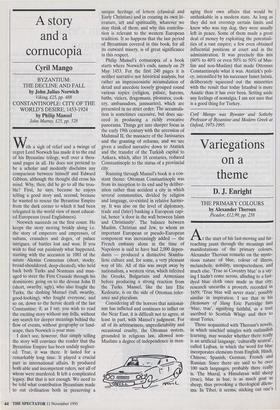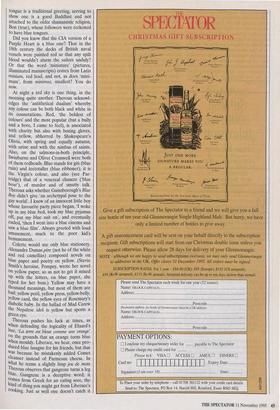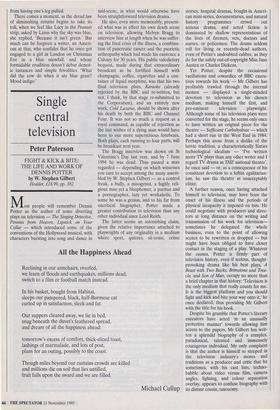Variegations on a theme
D. J. Enright THE PRIMARY COLOURS by Alexander Theroux Picador, £12.99, pp. 258 At the start of his fast-moving and far- reaching jaunt through the meanings and manifestations of the primary colours, Alexander Theroux remarks on the myste- rious nature of blue, colour of illness, melancholy, nobility, unexpectedness, and much else. 'True as Coventry blue' is a say- ing I hadn't come across, alluding to a fast- dyed blue cloth once made in that city; research unearths a proverb, recorded in 1659, 'True blue will never stain', possibly similar in inspiration. I see that in his Dictionary of Slang Eric Partridge lists `blue, true', signifying faithful, as a trait ascribed to Scottish Whigs and then to stout Tories.
Those acquainted with Theroux's novels, in which mischief mingles with outlandish learning, may wonder whether there really is an artificial language, 'culturally neutral', called Lojban, in which the word for blue incorporates elements from English, Hindi, Chinese, Spanish, German, French and Russian. Since there are said to be over 100 such languages, probably there really is. The bharal, a Himalayan wild sheep (true), blue in hue, is as much goat as sheep, thus provoking a theological dilem- ma. In Tibet, it seems, sticking out one's tongue is a traditional greeting, serving to show one is a good Buddhist and not attached to the older shamanistic religion, Bon (true), whose followers were reckoned to have blue tongues.
Did you know that the CIA version of a Purple Heart is a blue one? That in the 18th century the decks of British naval vessels were painted red so that any spilt blood wouldn't alarm the sailors unduly? Or that the word 'miniature' (pictures, illuminated manuscripts) comes from Latin minium, red lead, and not, as does 'mini- mum', from minimus, smallest? You do now.
At night a red sky is one thing, in the morning quite another. Theroux acknowl- edges the 'antithetical dualism' whereby any colour can be both black and white in its connotations. Red, 'the boldest of colours' and the most popular (but a bully and a bore, I came to feel), is associated with charity but also with boxing gloves, and yellow, abhorred by Shakespeare's Olivia, with spring and equally autumn, with urine and with the nimbus of saints. Also, on the salmons-in-both principle, Swinburne and Oliver Cromwell were both of them redheads. Blue stands for gin (blue ruin) and teetotaller (blue ribboner); it is the Virgin's colour, and also (see Par- tridge) that of a venereal chancre (`blue boar'), of murder and of smutty talk. Theroux asks whether Gainsborough's Blue Boy didn't give 'an archetypal pose to the gay world'. I knew of an innocent little boy whose favourite party piece began, 'I woke up in my blue bed, took my blue pyjamas off, put my blue suit on', and eventually ended, 'then I went into a blue cinema and saw a blue film'. Always greeted with loud amusement,. much to the poor kid's bemusement.
Colette would use only blue stationery. Alexandre Dumas pere (not he of the white and red camellias) composed novels on blue paper and poetry on yellow. (Stevie Smith's heroine, Pompey, wrote her novel on yellow paper, so as not to get it mixed 1.11) with the letters, on blue paper, she typed for her boss.) Yellow may have a thousand meanings, but most of them are bad: yellow peril, yellow press, yellow-belly, Yellow card, the yellow eyes of Rosemary's diabolic baby. In the ballad of Mad Carew the Nepalese idol is yellow but sports a green eye. Theroux pushes his luck at times, as When defending the logicality of Eluard's line, 'La terre est bleue comme une orange' on the grounds that an orange turns blue when mouldy. Liberace, we hear, once pro- duced blue lasagne for his friends, but that was because he mistakenly added Comet cleanser instead of Parmesan cheese. In what he terms a slightly limp jeu de mots Theroux observes that gangrene turns a leg blue. Gangrene is a deceptive word; it Comes from Greek for an eating sore, the kind of thing you might get from Liberace's cooking. Just as well one doesn't catch it from having one's leg pulled.
There comes a moment, as the dread law of diminishing returns begins to take its toll, when we feel like Lucy in the Peanuts strip; asked by Linus why the sky was blue, she replied, 'Because it isn't green.' But much can be forgiven a writer, an Ameri- can at that, who confides that he once got engaged to a girl in London on Christmas Eve in a blue snowfall, and whose formidable erudition doesn't debar demot- ic instances and simple frivolities. 'What did the cow do when it ate blue grass? Mood indigo.'




















































































 Previous page
Previous page